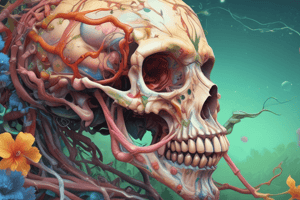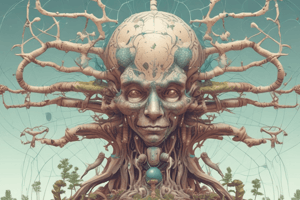Podcast
Questions and Answers
What is the study of the interactions between organisms and their environment?
What is the study of the interactions between organisms and their environment?
- Ecology (correct)
- Genetics
- Microbiology
- Botany
What is the molecule containing genetic instructions for development and function?
What is the molecule containing genetic instructions for development and function?
- Protein
- DNA (correct)
- RNA
- Carbohydrate
What is the process by which cells generate energy from nutrients?
What is the process by which cells generate energy from nutrients?
- Respiration (correct)
- Metabolism
- Gene Expression
- Photosynthesis
Flashcards are hidden until you start studying
Study Notes
Definition and Scope
- Biology is the scientific study of life and living organisms
- Examines the structure, function, growth, evolution, distribution, and taxonomy of all living things
- Encompasses various disciplines, including botany, zoology, microbiology, ecology, and biochemistry
Branches of Biology
- Botany: study of plants and plant-like organisms
- Zoology: study of animals and animal-like organisms
- Microbiology: study of microorganisms, such as bacteria and viruses
- Ecology: study of interactions between organisms and their environment
- Biochemistry: study of chemical processes and substances in living organisms
- Molecular Biology: study of structure, function, and interactions of biomolecules
- Genetics: study of heredity and variation in organisms
- Evolutionary Biology: study of evolution and diversity of life on Earth
Major Concepts
- Cells: basic unit of life, consisting of cell membrane, cytoplasm, and genetic material
- DNA (Deoxyribonucleic acid): molecule containing genetic instructions for development and function
- Genetics: study of how traits are inherited and expressed
- Evolution: change in species over time through natural selection, mutation, and genetic drift
- Ecosystems: interactions between living organisms and their environment
- Homeostasis: ability of organisms to maintain internal balance and stability
- Biodiversity: variety of species, ecosystems, and genes on Earth
Biological Molecules
- Carbohydrates: energy-rich molecules, such as sugars and starches
- Proteins: biomolecules with structural, functional, and regulatory roles
- Lipids: energy-rich molecules, such as fats and oils
- Nucleic Acids: DNA and RNA, containing genetic information
- ATP (Adenosine Triphosphate): energy currency of cells
Biological Processes
- Metabolism: conversion of energy and nutrients into cellular components
- Photosynthesis: process by which plants convert light energy into chemical energy
- Respiration: process by which cells generate energy from nutrients
- Cell Division: process of cell growth, reproduction, and repair
- DNA Replication: process of duplicating genetic material
- Gene Expression: process of translating genetic code into proteins
Definition and Scope of Biology
- Biology is the scientific study of life and living organisms, examining their structure, function, growth, evolution, distribution, and taxonomy.
- It encompasses various disciplines, including botany, zoology, microbiology, ecology, and biochemistry.
Branches of Biology
- Botany studies plants and plant-like organisms.
- Zoology studies animals and animal-like organisms.
- Microbiology studies microorganisms, such as bacteria and viruses.
- Ecology studies interactions between organisms and their environment.
- Biochemistry studies chemical processes and substances in living organisms.
- Molecular Biology studies the structure, function, and interactions of biomolecules.
- Genetics studies heredity and variation in organisms.
- Evolutionary Biology studies evolution and diversity of life on Earth.
Key Concepts in Biology
- Cells are the basic unit of life, consisting of cell membrane, cytoplasm, and genetic material.
- DNA is a molecule containing genetic instructions for development and function.
- Genetics is the study of how traits are inherited and expressed.
- Evolution is the change in species over time through natural selection, mutation, and genetic drift.
- Ecosystems involve interactions between living organisms and their environment.
- Homeostasis is the ability of organisms to maintain internal balance and stability.
- Biodiversity refers to the variety of species, ecosystems, and genes on Earth.
Biological Molecules
- Carbohydrates are energy-rich molecules, such as sugars and starches.
- Proteins are biomolecules with structural, functional, and regulatory roles.
- Lipids are energy-rich molecules, such as fats and oils.
- Nucleic Acids, including DNA and RNA, contain genetic information.
- ATP is the energy currency of cells.
Biological Processes
- Metabolism is the conversion of energy and nutrients into cellular components.
- Photosynthesis is the process by which plants convert light energy into chemical energy.
- Respiration is the process by which cells generate energy from nutrients.
- Cell Division is the process of cell growth, reproduction, and repair.
- DNA Replication is the process of duplicating genetic material.
- Gene Expression is the process of translating genetic code into proteins.
Studying That Suits You
Use AI to generate personalized quizzes and flashcards to suit your learning preferences.




